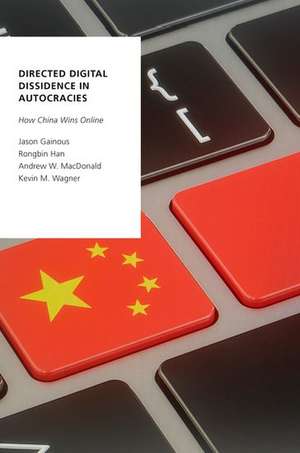Directed Digital Dissidence in Autocracies: How China Wins Online: Oxford Studies in Digital Politics
Autor Jason Gainous, Rongbin Han, Andrew W. MacDonald, Kevin M. Wagneren Limba Engleză Paperback – 4 ian 2024
Din seria Oxford Studies in Digital Politics
- 23%
 Preț: 190.50 lei
Preț: 190.50 lei - 18%
 Preț: 172.74 lei
Preț: 172.74 lei - 14%
 Preț: 190.59 lei
Preț: 190.59 lei - 14%
 Preț: 125.88 lei
Preț: 125.88 lei - 14%
 Preț: 186.82 lei
Preț: 186.82 lei - 9%
 Preț: 170.95 lei
Preț: 170.95 lei - 11%
 Preț: 124.04 lei
Preț: 124.04 lei - 13%
 Preț: 113.15 lei
Preț: 113.15 lei - 13%
 Preț: 140.87 lei
Preț: 140.87 lei - 8%
 Preț: 155.19 lei
Preț: 155.19 lei - 14%
 Preț: 260.44 lei
Preț: 260.44 lei - 8%
 Preț: 172.74 lei
Preț: 172.74 lei - 12%
 Preț: 129.91 lei
Preț: 129.91 lei -
 Preț: 320.09 lei
Preț: 320.09 lei - 13%
 Preț: 239.11 lei
Preț: 239.11 lei - 13%
 Preț: 127.32 lei
Preț: 127.32 lei - 12%
 Preț: 158.31 lei
Preț: 158.31 lei - 22%
 Preț: 180.44 lei
Preț: 180.44 lei -
 Preț: 349.79 lei
Preț: 349.79 lei - 13%
 Preț: 233.79 lei
Preț: 233.79 lei - 28%
 Preț: 490.84 lei
Preț: 490.84 lei - 5%
 Preț: 249.75 lei
Preț: 249.75 lei - 13%
 Preț: 196.29 lei
Preț: 196.29 lei - 14%
 Preț: 253.71 lei
Preț: 253.71 lei - 20%
 Preț: 228.43 lei
Preț: 228.43 lei - 27%
 Preț: 672.25 lei
Preț: 672.25 lei - 30%
 Preț: 641.98 lei
Preț: 641.98 lei - 27%
 Preț: 198.68 lei
Preț: 198.68 lei - 9%
 Preț: 171.85 lei
Preț: 171.85 lei - 25%
 Preț: 587.66 lei
Preț: 587.66 lei - 5%
 Preț: 267.42 lei
Preț: 267.42 lei - 26%
 Preț: 687.34 lei
Preț: 687.34 lei - 26%
 Preț: 874.14 lei
Preț: 874.14 lei - 23%
 Preț: 196.96 lei
Preț: 196.96 lei - 19%
 Preț: 190.50 lei
Preț: 190.50 lei
Preț: 132.79 lei
Preț vechi: 153.58 lei
-14% Nou
Puncte Express: 199
Preț estimativ în valută:
25.41€ • 26.72$ • 20.100£
25.41€ • 26.72$ • 20.100£
Carte disponibilă
Livrare economică 17-22 martie
Livrare express 12-18 martie pentru 41.39 lei
Preluare comenzi: 021 569.72.76
Specificații
ISBN-13: 9780197680391
ISBN-10: 0197680399
Pagini: 184
Dimensiuni: 156 x 235 x 11 mm
Greutate: 0.28 kg
Editura: Oxford University Press
Colecția OUP USA
Seria Oxford Studies in Digital Politics
Locul publicării:New York, United States
ISBN-10: 0197680399
Pagini: 184
Dimensiuni: 156 x 235 x 11 mm
Greutate: 0.28 kg
Editura: Oxford University Press
Colecția OUP USA
Seria Oxford Studies in Digital Politics
Locul publicării:New York, United States
Recenzii
The monograph provides an intriguing exploration of the effects of information control and public opinion management in China. It will appeal to a wide readership including China specialists, scholars of comparative authoritarianism, students of political communication and anyone interested in the impact of digital technologies on society and governance.
The book is a valuable contribution to the discourse on propaganda, digital dissidence and political expression in China.
The book is a valuable contribution to the discourse on propaganda, digital dissidence and political expression in China.
Notă biografică
Jason Gainous is the Associate Dean of Undergraduate Studies at the University of Louisville. His research focuses on information technology and politics. He is the co-author of Tweeting to Power: The Social Media Revolution in American Politics and Rebooting American Politics: The Internet Revolution. He has published widely in various journals and is the Co-Editor in Chief of Journal of Information Technology & Politics.Rongbin Han is Associate Professor of International Affairs at the University of Georgia. His research interests include contentious politics, media and cyber politics, and civic participation in China. He is the author of Contesting Cyberspace in China: Online Expression and Authoritarian Resilience and has recently published in The China Quarterly, Journal of Contemporary China, and Political Research Quarterly, among others.Andrew W. MacDonald is Assistant Professor of Social Science at Duke Kunshan University. He primarily works in the area of Chinese public opinion research, having authored nearly a dozen surveys of Chinese attitudes on politics, technology, and social questions. His work on this topic has been published in a wide variety of communication, technology, and experimental design journals.Kevin M. Wagner is Professor and Department Chair in Political Science at Florida Atlantic University. He is the co-author of Tweeting to Power: The Social Media Revolution in American Politics and Rebooting American Politics: The Internet Revolution. His work has been published in leading journals and law reviews, including Political Behaviour, Online Information Review, Journal of Information Technology & Politics and The Journal of Legislative Studies.
